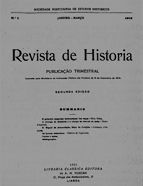

................................
This project later received state support. In 1918, the then-Minister of Public Instruction, José Alfredo de Magalhães, issued two ordinances (9 February 1918, Nos. 1221 and 1222), commissioning the society to complete two tasks: the organisation of a Vade-mecum do Investigador Histórico [ Vade-mecum of the Historical Researcher ] and the compilation of a Bibliografia Histórica Portuguesa [ Portuguese Historical Bibliography ]. One of the members, Luiz Teixeira Sampaio, did not overlook this request, writing that such a mandate from the State attested to the significance of the SPEH within the scientific context of its time ( Revista de História , vol. 7, pp. 320–321). This highlights the pioneering role of the Society in the institutionalisation of historical research in Portugal, complementing the Institutes of Historical Studies formally established by the 1911 university reform. However, once again, there is no record that these projects were ever completed—or even initiated .
This state endorsement came during what might be termed a more diffuse phase of the SPEH's existence. A turning point in its associational life can be pinpointed to 1915, when the publication of the society's social reports (one of the few available sources) ceased, despite being statutorily required. Although the aforementioned state encouragement persisted, certain details suggest a decline in the SPEH’s activities. The drop in the number of articles published in the Revista de História from 1916 onwards is indicative: the number halved to 10–15 per volume until the society’s end, compared to 20 articles per volume in its early years ( A SPEH no contexto historiográfico nacional , p. 67). Key members, including Fidelino de Figueiredo, Edgar Prestage, João Lúcio de Azevedo, and Fortunato de Almeida, contributed fewer articles over time. While Fidelino remained consistent, others made way for lesser-known figures. However, the year 1915 revealed certain structural shortcomings within the SPEH that had been present from its inception. In the second year of the SPEH's existence, Fidelino de Figueiredo expressed, in one of the reports, some disappointment with the low participation of members in the regular sessions (some of which could not take place due to a lack of quorum) ( Revista de História , vol. 2, pp. 293–296). In a letter to Edgar Prestage, he mentioned that he had seriously considered resigning, as he found himself alone in handling the administrative tasks, to which Prestage replied "I beg you not to condemn the society to death by resigning" ( A SPEH no contexto historiográfico nacional , p. 47, note 144). Fidelino later reflected on these challenges in a passage written after the dissolution of the SPEH:
This work is financed by national funds through FCT - Foundation for Science and Technology, I.P, in the scope of the projects UIDB/04311/2020 and UIDP/04311/2020.
